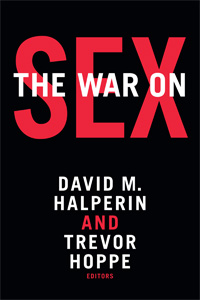
David M. Halperin, Ph.D.
W. H. Auden Distinguished University Professor of the History and Theory of Sexuality and Professor of English
University of Michigan, Ann Arbor
Born in 1952 in Chicago, Ill., USA
Studied Classics at Oberlin College and Stanford University
Project
What Is Sex For?
Does sex have any erotic purpose? Does it advance the lover's goal? Is sex what the lover really wants? The greatest philosophers of classical antiquity, Plato and Aristotle, said no. I examine their arguments and I connect them with a tradition of pre-modern erotic theory that did not see desire as sexual in nature or as rooted in sexuality. My aim is to contest the modern interpretations of love, including but not limited to psychoanalytic interpretations, that understand love in reductively sexual terms and that view all erotic desire as an expression of sexuality. For this purpose, I consider some contemporary writing, especially gay male writing, which I read as a singular effort to work through the confusions and the anguish that the modern sexualization of erotic desire has bequeathed to us.Recommended Reading
Halperin, David M. How to Be Gay. Cambridge, Mass.: Belknap/Harvard University Press, 2012.
-. How to Do the History of Homosexuality. Chicago: University of Chicago Press, 2002.
-. Saint Foucault: Towards a Gay Hagiography. New York: Oxford University Press, 1995.
Colloquium, 04.11.2014
What Is Sex For?
In 1844 Schopenhauer added a nutty, though intermittently brilliant, supplement called "The Metaphysics of the Loves of the Sexes" (Metaphysik der Geschlechtsliebe) to The World as Will and Representation. Claiming to be the first philosopher to tackle the topic of "love" (Liebe), Schopenhauer went on to define love as an individualized expression of a species-wide sexual drive (Geschlechtstrieb), a drive that reflects "the whole human race’s intent meditation on the composition of the next generation". Schopenhauer was right to claim that he had no predecessors and that all earlier philosophers of love were wrong: during the previous 2,225 years of erotic theorizing in the West, no one had ever understood love or erotic desire (erôs) in that outlandish way.
Schopenhauer’s definition has gone on to become the standard modern view of love. It has attained, improbably but just as Schopenhauer intended, the status of science. Freud, who only occasionally recognized Schopenhauer as a precursor, followed him in correcting a longstanding mistake about love, a mistake that is itself constitutive of love. As Leo Bersani puts it, Freud’s breakthrough was to realize that desire constitutively mistakes its object for its source. All previous thinking about desire not only made that mistake: it was the expression of such a mistake. To take desire as a response to an object, as a consequence of the desirability (or “beauty”) of that object, as a testimony to some property of the object, instead of as an expression of the subject’s own libido, or "drive" (Trieb), is to mystify the nature of desire and to surrender forever the possibility of understanding it.
Proust agreed: "she was really sweet" (elle était bien gentille), he concluded, actually means "I got pleasure out of kissing her" (j’avais du plaisir à l’embrasser). "A la recherche du temps perdu" is one long effort to dramatize the discovery of that painful but necessary truth.
I want to challenge this modern consensus, particularly its scientific understanding of desire and its sexual etiology of love. It is not my aim to recover some pre-modern humanistic definition of love. I do not wish to mystify, romanticize, or sentimentalize erotic desire. Nor do I want to promote some New Age spirituality or to encourage obscurantism of any kind. I do believe, however, that the tendency to conceptualize all erotic desire in terms of sexuality has been catastrophic for modern thought and I have devoted much of my career, especially my recent career, to working against it. This talk represents the latest installment.
Publications from the Fellow Library
Halperin, David M. (Princeton, 2023)
Rehearsals of manhood : Athenian drama as social practice
Halperin, David M. (Durham, 2017)
Halperin, David M. (2016)
Halperin, David M. (2016)
Halperin, David M. (2015)
Halperin, David M. (Paris, 2015)
L'art d'être gai How to ge gay <franz.>
Halperin, David M. (Cambridge, Mass. [u.a.], 2012)
Halperin, David M. (Ann Arbor, 2007)
What do gay men want? : an essay on sex, risk, and subjectivity
Halperin, David M. (2006)
Halperin, David M. (2005)
Made at Wiko 10/11/16
Köpfe und Ideen 2015
Desiring Differently
a portrait of David M. Halperin by Jutta Person


